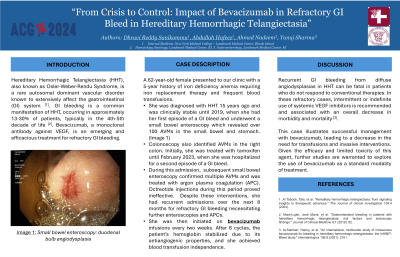Monday Poster Session
Category: GI Bleeding
P2531 - From Crisis to Control: Impact of Bevacizumab in Refractory GI Bleed in Hereditary Hemorrhagic Telangiectasia
Monday, October 28, 2024
10:30 AM - 4:00 PM ET
Location: Exhibit Hall E

Has Audio

Dhruvi Sanikommu, MD
Landmark Medical Center
Woonsocket, RI
Presenting Author(s)
Abdullah Hafeez, MD1, Dhruvi Sanikommu, MD2, M Housam Nanah, MD3, Tanuj Sharma, MD2, Ahmed Nadeem, MD2
1Landmark Medical Center, Cumberland, RI; 2Landmark Medical Center, Woonsocket, RI; 3Cleveland Clinic, Cleveland, OH
Introduction: Hereditary Hemorrhagic Telangiectasia (HHT), also known as Osler-Weber-Rendu Syndrome, is a rare autosomal dominant vascular disorder known to extensively affect the gastrointestinal (GI) system. GI bleeding is a common manifestation of HHT, occurring in approximately 13-30% of patients, typically in the 4th-5th decade of life. Bevacizumab, a monoclonal antibody against vascular endothelial growth factor (VEGF), is an emerging and efficacious treatment for refractory GI bleeding.
Case Description/Methods: A 62-year-old female presented to our clinic with a 5-year history of iron deficiency anemia requiring iron replacement therapy and frequent blood transfusions. She was diagnosed with HHT 15 years ago and was clinically stable until 2019, when she had her first episode of a GI bleed and underwent a small bowel enteroscopy which revealed over 100 AVMs in the small bowel and stomach. Colonoscopy also identified AVMs in the right colon. Initially, she was treated with tamoxifen until February 2023, when she was hospitalized for a second episode of a GI bleed. During this admission, a subsequent small bowel enteroscopy confirmed multiple AVMs and was treated with argon plasma coagulation. Octreotide injections during this period proved ineffective. Despite these interventions, she had recurrent admissions over the next 8 months for refractory GI bleeding necessitating further enteroscopies and argon plasma treatments. She was then initiated on bevacizumab infusions every two weeks. After 6 cycles, the patient’s hemoglobin stabilized due to its antiangiogenic properties, and she achieved blood transfusion independence.
Discussion: Recurrent GI bleeding from diffuse angiodysplasias in HHT can be fatal in patients who do not respond to conventional therapies. In these refractory cases, intermittent or indefinite use of systemic VEGF inhibitors is recommended and associated with an overall decrease in morbidity and mortality. This case illustrates successful management with bevacizumab, leading to a decrease in the need for transfusions and invasive interventions. Given the efficacy and limited toxicity of this agent, further studies are warranted to explore the use of bevacizumab as a standard modality of treatment.
Disclosures:
Abdullah Hafeez, MD1, Dhruvi Sanikommu, MD2, M Housam Nanah, MD3, Tanuj Sharma, MD2, Ahmed Nadeem, MD2. P2531 - From Crisis to Control: Impact of Bevacizumab in Refractory GI Bleed in Hereditary Hemorrhagic Telangiectasia, ACG 2024 Annual Scientific Meeting Abstracts. Philadelphia, PA: American College of Gastroenterology.
1Landmark Medical Center, Cumberland, RI; 2Landmark Medical Center, Woonsocket, RI; 3Cleveland Clinic, Cleveland, OH
Introduction: Hereditary Hemorrhagic Telangiectasia (HHT), also known as Osler-Weber-Rendu Syndrome, is a rare autosomal dominant vascular disorder known to extensively affect the gastrointestinal (GI) system. GI bleeding is a common manifestation of HHT, occurring in approximately 13-30% of patients, typically in the 4th-5th decade of life. Bevacizumab, a monoclonal antibody against vascular endothelial growth factor (VEGF), is an emerging and efficacious treatment for refractory GI bleeding.
Case Description/Methods: A 62-year-old female presented to our clinic with a 5-year history of iron deficiency anemia requiring iron replacement therapy and frequent blood transfusions. She was diagnosed with HHT 15 years ago and was clinically stable until 2019, when she had her first episode of a GI bleed and underwent a small bowel enteroscopy which revealed over 100 AVMs in the small bowel and stomach. Colonoscopy also identified AVMs in the right colon. Initially, she was treated with tamoxifen until February 2023, when she was hospitalized for a second episode of a GI bleed. During this admission, a subsequent small bowel enteroscopy confirmed multiple AVMs and was treated with argon plasma coagulation. Octreotide injections during this period proved ineffective. Despite these interventions, she had recurrent admissions over the next 8 months for refractory GI bleeding necessitating further enteroscopies and argon plasma treatments. She was then initiated on bevacizumab infusions every two weeks. After 6 cycles, the patient’s hemoglobin stabilized due to its antiangiogenic properties, and she achieved blood transfusion independence.
Discussion: Recurrent GI bleeding from diffuse angiodysplasias in HHT can be fatal in patients who do not respond to conventional therapies. In these refractory cases, intermittent or indefinite use of systemic VEGF inhibitors is recommended and associated with an overall decrease in morbidity and mortality. This case illustrates successful management with bevacizumab, leading to a decrease in the need for transfusions and invasive interventions. Given the efficacy and limited toxicity of this agent, further studies are warranted to explore the use of bevacizumab as a standard modality of treatment.
Disclosures:
Abdullah Hafeez indicated no relevant financial relationships.
Dhruvi Sanikommu indicated no relevant financial relationships.
M Housam Nanah indicated no relevant financial relationships.
Tanuj Sharma indicated no relevant financial relationships.
Ahmed Nadeem indicated no relevant financial relationships.
Abdullah Hafeez, MD1, Dhruvi Sanikommu, MD2, M Housam Nanah, MD3, Tanuj Sharma, MD2, Ahmed Nadeem, MD2. P2531 - From Crisis to Control: Impact of Bevacizumab in Refractory GI Bleed in Hereditary Hemorrhagic Telangiectasia, ACG 2024 Annual Scientific Meeting Abstracts. Philadelphia, PA: American College of Gastroenterology.
